Mrs. Carolyn B. Shelton Tells of Her Work as Private Secretary and of Being Occasionally the State’s Chief Executive
a reprint from the Oregonian dated January 11, 1914
She was Governor of Oregon. In every woman’s organization there is a “Madam President,” “Madam Chairman” or other similar title to signify that one of the opposite sex is holding an office once held sacred to masculine occupancy.
But “Madame Governor” strikes the ear with all the iconoclastic significance of modern times, and to hear it applied to the chief executive of a state is to mark an entirely new era in the march of progress.
And the pioneer “Madam Governor” is Mrs. Carolyn B. Shelton, of Union County, Oregon who now applies the qualities which once served her in good stead as the Governor of her native state to performing the duties of private secretary to Senator George E. Chamberlain.
To enter a man’s business world untried and without any previous training, at an age when a youth would not have yet reached his majority, and to have accomplished all she has, would be an achievement of which any man of middle age might be proud.
Mrs. Shelton began while yet a girl and has forged steadily ahead, until today, in her capacity of private secretary to a United States Senator, she also performs the duties of clerk to the Senate committee on military affairs, which committee is one of the most important adjuncts to that legislative body.
At the time Mrs. Shelton was Acting Governor of the state the law read that in the event of the chief executive’s death the Secretary of State should become Governor, and it was the custom that in the absence of the Governor his private secretary should become acting head of the state.
Oregon, of course, had had other Governors, and during the absence of these men private secretaries had often become the acting heads of the state.
The whole thing, therefore, hinged upon the fact that never before had a Governor had a woman as his private secretary. Consequently, several years before Oregon took its place among the equal suffrage states there had been a “Madam Governor” at its head.
Once Mrs. Shelton, for a period of a week, was actually the Governor, although she was still called “Acting Governor.” That was when Governor Chamberlain, elected to the Senate, took the train for Washington February 27, 1909, without having relinquished his office, to be sworn in as a Senator the following March 4. In that interim there was no one above Mrs. Shelton and for those days she was, in fact, Governor of the State of Oregon.
If perchance one were to meet the clerk of the Senate committee on military affairs one would find a tall, slender woman, with dark eyes and hair, a woman with a charming manner, and behind it all a subtle personality. And if this same person were such an one as believes the woman who fills public office wears square-toed boots, has short hair and uses spectacles—why, he would exclaim without more ado that this could not be the Mrs. Shelton who was “Madame Governor” of Oregon. And he might, to clinch the argument, tell of her quietness of manner, modulated voice and especially of her taste in dress. In fact, this Mrs. Shelton is just such a woman as he would picture in his mind as seated behind a tea table at a fashionable afternoon function.
Yet the two are one. The Mrs. Shelton who was “Madam Governor” is capable and a born executive. This is the woman to whom one could not easily lie or ask to enter a crooked deal. This is the woman who has proven her ability by having been with one man for 18 years as his private secretary. The other is the Mrs. Shelton who during Senator Chamberlain’s term as Governor assisted at innumerable state and other social affairs at Salem, Oregon’s capital.
Mrs. Shelton tells the story of her accomplishments simply and with an absolute lack of self-consciousness. In fact, she claims that everything came so gradually that she was really unaware of it until actually placed at the head of a great state.
“I started my business career in the office of Senator Chamberlain, who was then a member of a well-known Portland law firm. At that time I was absolutely untried and without experience so far as business was concerned. But I did have the desire to learn and become efficient. As a stenographer I came in contact with many of the more technical points of law and these I learned.
“I believe that if one has a natural aptitude for the technical terms of law the study of it becomes comparatively easy. That I was able to grasp the subject was proven by the fact that later on I was allowed to draw many of the legal papers prepared in the office, such as deeds, mortgages, confirmations of sales and others – work which is usually entrusted to a young lawyer.
“When Senator Chamberlain was elected District Attorney of Multnomah County I was with him as his private secretary. All my previous experience had been with commercial law matters, but in my new position I added to it much knowledge of criminal law and learned to draw up indictments, etc.
“It was from this office that I became private secretary to the Governor, Senator Chamberlain having been elected in 1902. I went with him to Salem, the state capital, and took the oath of office as his private secretary. But I do not think I ever realized that I would in all probability be acting Governor of the state. The increased duties and responsibilities of my new office left little opportunity for speculation along other lines.
“By this time I had been with the Senator several years, had become accustomed to his work and his methods, and my elevation from the position of stenographer in his law office to acting as Governor in his absence was so gradual that I never realized it was happening. It seemed to me only natural that I should continue with the Senator as his private secretary as he went from one position to another.
“It was not the office that had broadened so much – it was its legal significance. So when the Senator went away for the first time after he had taken his oath of office as Governor of Oregon, I suddenly found that I was, so to speak, in his shoes, and was really “’Madam Governor.’”
To be acting Governor of the State of Oregon is no empty honor. And to be the one delegated to “sit on the lid” of a state whose politics are more or less turbulent and complicated means a great deal, especially when the one upon which this duty devolves is a woman.
About the first question that was asked Mrs. Shelton upon the occasion of her initial occupancy of the Governorship was what she would do in regard to pardons. And Mrs. Shelton answered promptly and emphatically: “I shall grant none,” and she told the reason why.
“I do not believe in too free a use of the pardoning power,” she said. “Every man and woman, too, should, in my opinion, submit to the punishment prescribed for their lawless acts whether the penalty be imprisonment or death. Prisons are necessary for the protection of society; and capital punishment is absolutely essential as a deterrent to the commission of capital crimes. It has been my experience that men, hardened criminals, who unchecked would go to any lengths, will stop when they face the only thing that they absolutely fear – a legal death.
“In Oregon conditions are vastly different from those in the East. For instance, Oregon is credited many times with criminals which do not, rightfully speaking, belong upon her rolls. I mean that lawbreakers, often of the worst class in endeavoring to escape arrest, will start West. And they may reach our state, and while there be arrested for a petty crime, with the result that they become members of the State Penitentiary convict force.
“When I say I believe in imprisonment and capital punishment I do not intend to imply a lack of sympathy for the criminals themselves. I do not lack that sympathy at all, and I believe that a prison should be made as nearly perfect as such an institution can. There are many conditions surrounding the prison system of today which are bad.
“Take the young man sent up for his first offense. He is thrown into intimate contact with the worst of habitual lawbreakers. When he is released he has his criminal record, a suit of clothes and $5. And the result is that there is nothing for him. If he seeks honest employment and tries to overcome the obstacle of his previous life he has yet to face the probable blackmail of other criminals – a phase of criminal life which is by no means to be overlooked. I believe in the organization of societies for the purpose of helping convicts upon their release.
“The problem of teaching the convicts a trade which they can follow after their release is a subject that has aroused considerable attention in recent years, and properly so. In Salem there was a tailor shop and a shoe factory and at one time, a foundry, all maintained at the penitentiary. My opinion in regard to prisons and punishment is simply this: While I favor imprisonment, I do not favor so branding a man that his whole future may be ruined.”
There have been many other movements afoot in Oregon in which Mrs. Shelton took a keen interest. And equally important as any have been the feminist movements, which, by the way, have taken more than the shape of “votes for women.”
“I am very glad the women of Oregon were enfranchised,” Mrs. Shelton said, “because they worked long, seriously and conscientiously for it, and deserved success. But equal rights were far from a sudden victory. Mrs. Abigail Scott Duniway, called the “mother of suffrage” in Oregon, began the movement there, and she is now past 80. The women of Oregon were ready for the vote, and I feel that they will use it wisely. Long before they received the vote they had accomplished much good in many ways. We have a child labor law and an eight-hour working day for women and several others tending to help women and children, all of which are the result of the efficient work of our women.”
One should not imagine from her interest in prisons and women’s movements Mrs. Shelton had neglected the truly feminine side of things – and by truly feminine the old-time idea of a woman is meant. For Mrs. Shelton believes in that peculiar quality possessed by women which they call intuition. She is no more able than most women to tell whence this ability comes or just what it is, yet she believes in it. Furthermore, she says that in her work – coming in contact with all kinds and manner of men and women – it has stood her in good stead. “Hunches,” to fall back upon a slang term which may be taken as synonym for intuition, have more often than not proved true.
And so while Mrs. Shelton has gone into the world of politics with a straightforward look in her eyes, and has played games usually entered only by men, she has still clung to her belief in this purely feminine perquisite and had the nerve to use it, all other things being equal.
In summing up her success, Mrs. Shelton said that it was due to hard work. “If I were asked to give a motto to women about to enter the business world I should say, ‘A capacity for, and a willingness to work.’ Real success means hard, long hours of work, and comes only to those willing to give them.”



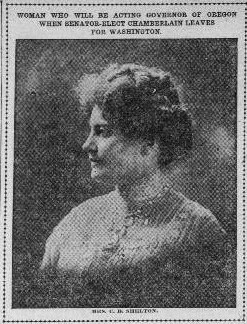
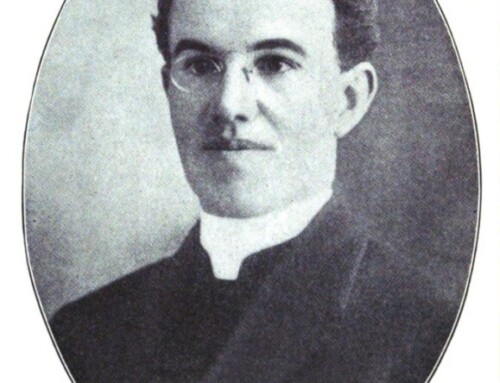
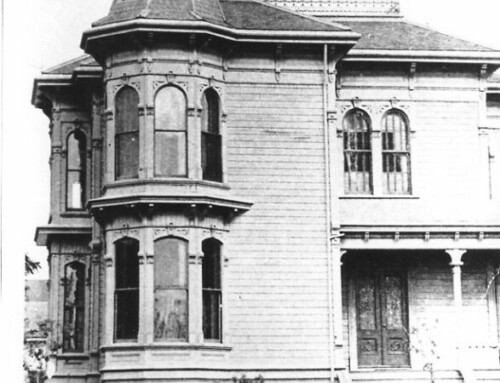
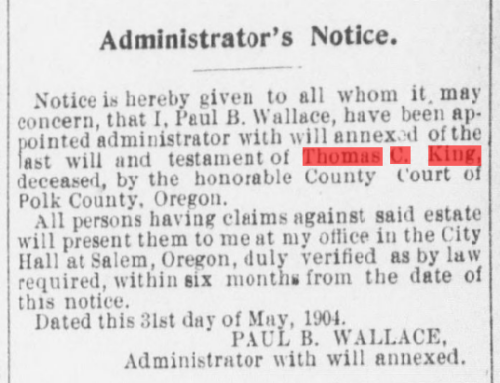
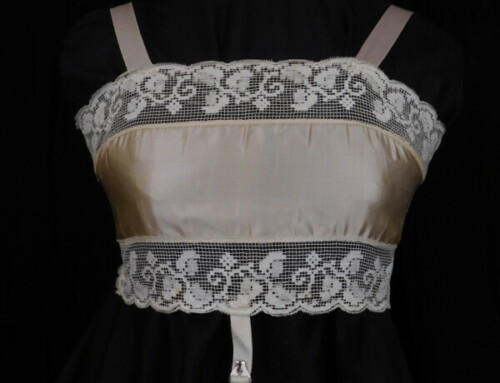
Leave A Comment